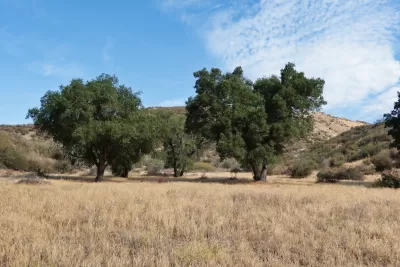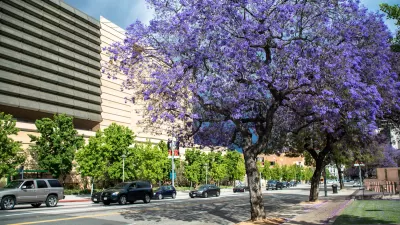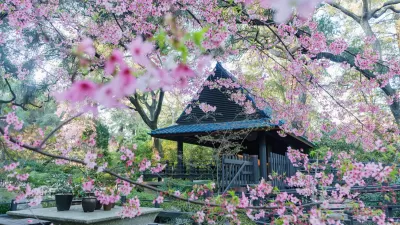The new exhibit explores the hidden network that allows heritage coast live oak trees to communicate with one another.

Focusing on Descanso Gardens’ heritage coast live oaks (Quercus agrifolia), Trees Talk explores the hidden network that allows trees to communicate with one another. Some centuries old, the oaks are magnificent giants that can grow up to 100 feet tall and are what remains of a forest that once blanketed the region. This exhibition showcases touchable and interactive elements, drawing on actual wood taken from oaks that tragically fell during a severe storm last year. Visitors can also examine acorn sprouts that show how roots develop as an oak tree grows. Trees Talk is open at the Sturt Haaga Gallery from March 16 to June 2.
The coast live oak is known as a “keystone species,” meaning that the tree supports the existence of hundreds of other species, including mammals, birds, insects, fungi, plants, reptiles, and amphibians. The Tongva people were the first people to live on the land where Descanso Gardens is today. They relied on coast live oak acorns as one of their most important plant foods due to its high nutritional value, abundance, and versatility. Acorns remain sacred to the Tongva community and are a staple in traditional meals. The importance of the coast live oak in the interconnected web of life cannot be overstated.
Los Angeles County is home to numerous public gardens, including the 150-acre Descanso Gardens which is one of four botanic gardens and arboreta in the county's park system. Development at the Gardens is guided by a Master Plan that was adopted by the L.A. County Board of Supervisors in 2020. The Master Plan seeks to implement the mission of the Gardens, which is "to practice exemplary stewardship of Descanso’s distinctive character and assets; offer people an experience close to nature; and cultivate understanding of the natural world and people’s place in it through inspiration, education and example."
FULL STORY: Descanso Gardens Hosting ‘Trees Talk’

Maui's Vacation Rental Debate Turns Ugly
Verbal attacks, misinformation campaigns and fistfights plague a high-stakes debate to convert thousands of vacation rentals into long-term housing.

Planetizen Federal Action Tracker
A weekly monitor of how Trump’s orders and actions are impacting planners and planning in America.

In Urban Planning, AI Prompting Could be the New Design Thinking
Creativity has long been key to great urban design. What if we see AI as our new creative partner?

King County Supportive Housing Program Offers Hope for Unhoused Residents
The county is taking a ‘Housing First’ approach that prioritizes getting people into housing, then offering wraparound supportive services.

Researchers Use AI to Get Clearer Picture of US Housing
Analysts are using artificial intelligence to supercharge their research by allowing them to comb through data faster. Though these AI tools can be error prone, they save time and housing researchers are optimistic about the future.

Making Shared Micromobility More Inclusive
Cities and shared mobility system operators can do more to include people with disabilities in planning and operations, per a new report.
Urban Design for Planners 1: Software Tools
This six-course series explores essential urban design concepts using open source software and equips planners with the tools they need to participate fully in the urban design process.
Planning for Universal Design
Learn the tools for implementing Universal Design in planning regulations.
planning NEXT
Appalachian Highlands Housing Partners
Mpact (founded as Rail~Volution)
City of Camden Redevelopment Agency
City of Astoria
City of Portland
City of Laramie





























